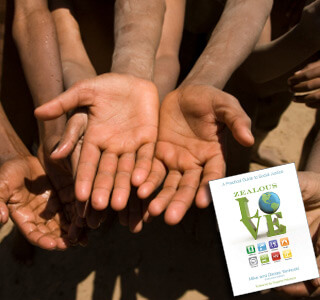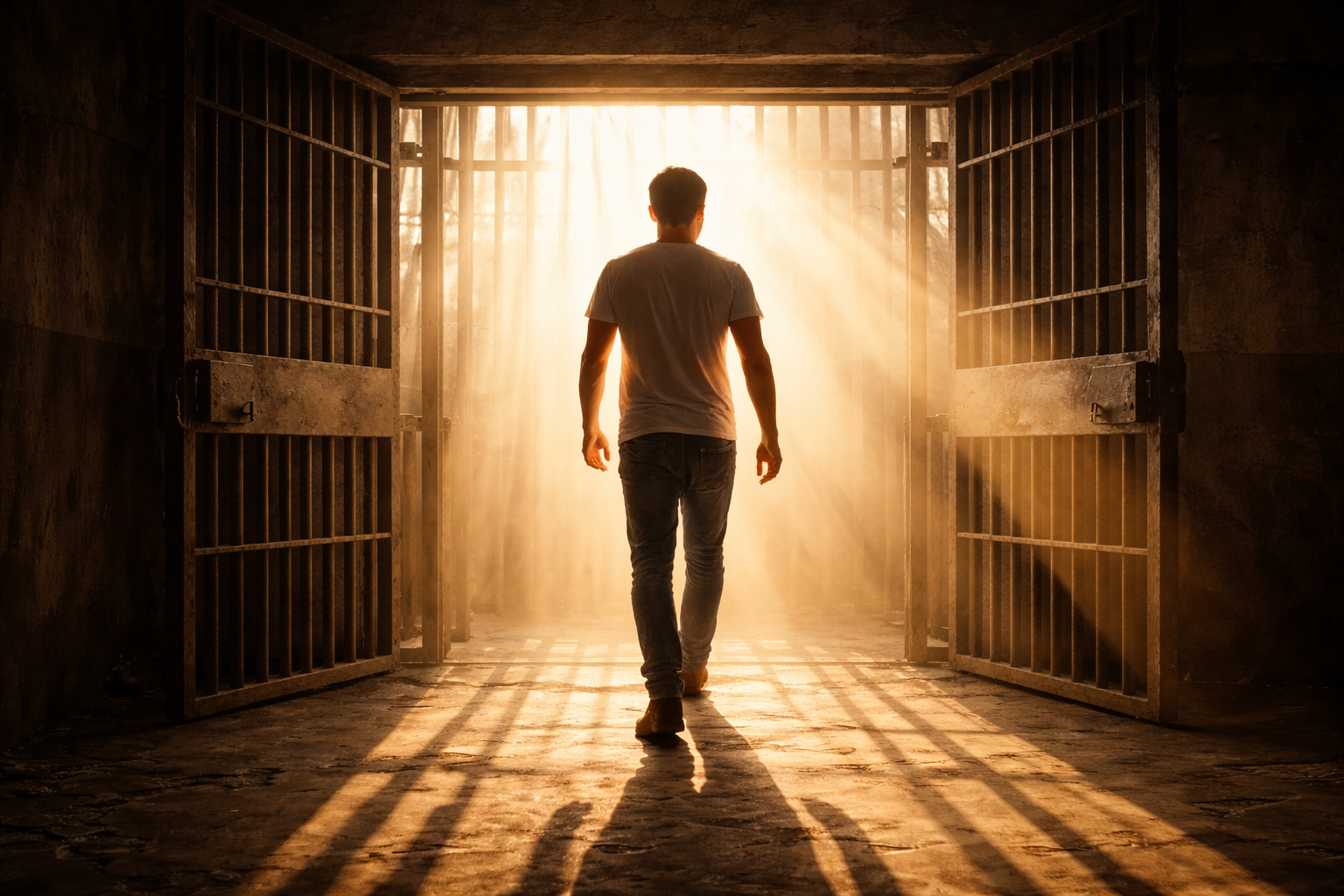The
world has a lot of major problems that we in affluent nations tend to
ignore. The trouble is, these issues are so big they make us feel like
there’s nothing we can do, so we don’t do anything. That’s why Mike and
Danae Yankoski wrote Zealous Love: A Practical Guide to Social
Justice. It breaks down some of the biggest needs and provides
information on ways we can do something about them. Please read our
interview with Mike and pray about how you can help.This article was originally posted in New Man e-Magazine.

that haven’t heard of it, what does the term “social justice” mean?
Mike Yankoski: Social
justice is the necessary outworking of the radical love that Christ
has shown for us. As followers of Christ, we know that God loves us,
and we are commanded by Christ to love our neighbors as ourselves.
Social justice is the way of working that out in the world. People in
this world are hungry, without clean water, fighting diseases and human
trafficking, and our response to these things needs to be framed by
God’s love for us.
New Man: How
did you get into this?
Yankoski: It
was a couple of different things coming together. A few years ago, my
friend Sam and I chose to become homeless and live in six different
American cities for five months. Then we wrote a book called Under
the Overpass, which chronicled our journey. That experience showed
me that the church is doing a wonderful job in areas of loving those
in need and a bad job in other areas.
My wife and I also worked
together in Uganda, Ecuador and Belize, and seeing the huge amount of
needs, the poverty and the dire situations gave us a tangible and real
understanding of the extreme hindrances people face to lives lived in
full. We have a strong belief that Christianity is a powerful force for
good, and yet these great needs continue to exist.
Often we’ll see these
needs and not know how to respond. It can be overwhelming. Zealous
Love is designed to aid that by breaking down each issue into
something more manageable and showing people how they can make a
difference.
New
Man: Could you tell us about a few of the issues in the book?
Yankoski:
The first one is human trafficking. It’s essentially the global trade
in human beings, whether for forced labor or sexual exploitation. It’s a
wicked reality. Somewhere between 12 [million] and 27 million people
are enslaved around the world. You think about Luke 4:18, where Jesus
takes the scroll of Isaiah and proclaims freedom for the prisoners and
release for the oppressed. We are working out what Christ has begun.
How can we not address the fact
that so many people are enslaved today, in light of who we’ve been
called to be? How can we not see these things, particularly things like
child sex trafficking, and not respond?
The second issue is unclean
water. Over 1.1 billion people in the world don’t have access to safe
water. More than 2.4 billion don’t have access to adequate sanitation.
That substantially hinders life for people, particularly children.
Without access to safe water, preventable diseases begin to cost
millions of lives. Cholera, typhoid, even something like diarrhea can
be lethal.
But it’s more than disease. When
we were in Uganda, it’s largely the responsibility of children to fetch
water. They can travel anywhere from one to five miles to look for it.
What that means is they’re not able to go to school. It perpetuates
the poverty of their situation.
Education is one of the other
topics because it is directly linked to improving your life. When kids
can’t spend time with studies because they are fetching water or
working in the fields, it keeps them trapped in poverty. For many of
these families, if their kids don’t work, they will starve.
The American notion of pulling
yourselves up by your bootstraps is great unless you don’t have any
boots. We need to figure out how to love neighbors in that situation,
not by patronizing them, but by empowering them.
Another issue is refugees. There
are so many different refugee situations. These people are completely
displaced. Everything they know to be home has been taken from them.
Many end up in refugee camps.
In Uganda, there were internal
refugee camps for those displaced by rebel armies. The strain of caring
for these people falls on the government’s shoulders, and they don’t
have the type of resources to care for them. Life in the camps gets
pretty bleak—disease, lack of education, crime, rape.
It’s not just for refugees
everywhere, not just in developing countries. My wife and I live in a
community house in Canada. One of the purposes for it is to care for
those in need. One gentleman is a refugee from Iraq. Life is difficult
for him because he doesn’t read or speak English. Employment
opportunities are difficult, he has major trouble with the medical
system and he can’t get education. You think about everything home means
to us—a safe place, a place for family. That has all been stripped
away.
Another thing we look at is
HIV/AIDS. Obviously this is a tricky one, because it is spread through
sex, mostly. It can also be transferred from mother to infant as well.
That’s a big deal in the developing world because, while
anti-retroviral drugs can prevent that mother-infant transference, they
don’t have access to the medication. You have 5,500 people that die
every day from AIDS. The number of children impacted is just
devastating. AIDS is a slow and brutal decline, so you’ll have children
who have to care for their sick parents. Then they become orphans.
There’s also a problem with
providing accurate information on the disease. In Zambia, for example,
there is a belief that has been popularized by mystic healers which
says that if you have sex with a virgin, it will cure HIV. The rate of
child rapes in the country have significantly increased because of
that.
The question we face in
the midst of this horrific situation is how to care for these people.
There are three facets we believe in. The first is helping to provide
funding for retroviral drugs. The next is providing relief for those
affected, including the children and orphans. The third is to help
provide information about the disease to help stop its transmission.
New
Man: You call this book a practical guide. What practical advice
does it provide?
Yankoski: The
whole notion of a practical guide is that it’s meant to provide more
than just information. It’s meant to inspire us to do something about
one of these issues. We’re not calling people to dive into every single
issue and spin their wheels worrying about everything. We’re hoping to
do two things. One, argue for why social justice is such an important
aspect of the Christian life. It’s an apologetic for caring for others.
The second thing is to encourage people to find one of the issues and
become an advocate for it. Learn about it, get involved in helping with
it and tell others about it.
There are so many needs out
there. We’ve chosen eight areas, but they’re not the only ones. What
we’re asking people to do is be discerning and carefully attentive to
where the Spirit of God is moving you. We want you to become an active
catalyst for substantial change in one of these areas.
To help do that, at the
end of each section we make specific recommendations about things
people can do. There are ways to cut down on consumption, ways to get
involved and organizations you can support. We want to help you engage
that area as easily as possible. But everybody is different, and you
should discern what God is calling you to do.
New
Man: How did writing this book change your life?
Yankoski: It
has had a huge impact on our lives. The fact that we are living in a
community house right now is a way of us trying to work out things we
feel deeply about. It would be much easier for us not to live in this
place, but God has called us to care for people who are in the midst of
need. Danae and I have changed our spending habits to try to do more
about some of the issues in this book. It’s not that we’ve got it all
figured out, but we’re doing things like not purchasing items that
depend on injustices to the poor and seeking to love others more. We’re
not doing it to be do-gooders. We’re doing it because Christ first
loved us.
For more information about Zealous
Love and ways to help with these issues, visit zealouslove.org.












































